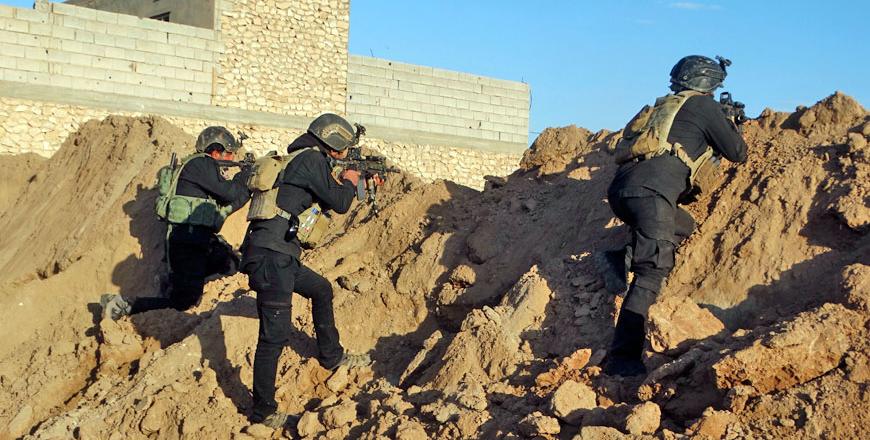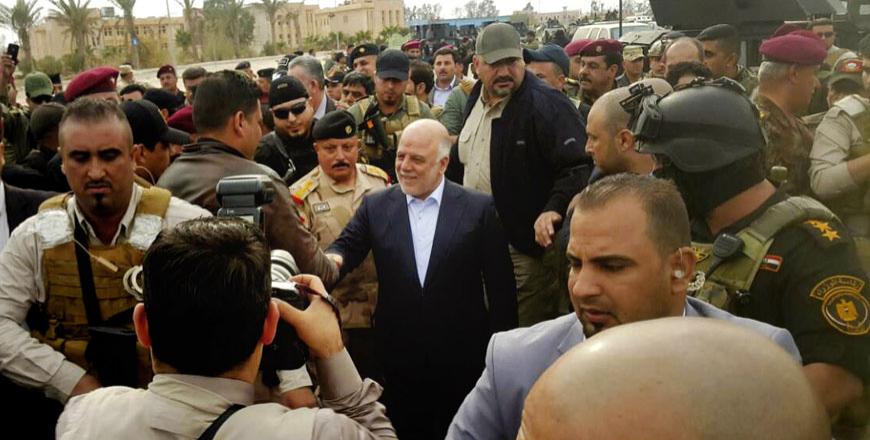You are here
Iraqi forces surround Ramadi, but it could be a long siege
By AP - Dec 01,2015 - Last updated at Dec 01,2015

Iraqi security forces take combat position at the front line with Daesh militants as Iraqi army and allied Sunni volunteer tribal fighters supported by US-led coalition air strikes tightened the siege of Ramadi, the capital of Iraq's Anbar province, 115 kilometres west of Baghdad, Iraq, on Monday (AP)
BAGHDAD — After months of sluggish progress, stalled advances and outright failures, Iraqi troops and militias backed by US-led air strikes have surrounded the key city of Ramadi and appear poised to launch a new attempt to wrest it from the Daesh terror group.
The battle that is shaping up threatens to turn into a drawn-out siege, with thousands of residents caught in the middle as the forces try to wear down the militants since they took over the capital of western Anbar province in May. Western officials and analysts warned that the strategy of a methodical, slow siege could make the fight even more difficult.
On Monday, the Iraqi military dropped leaflets into the city, telling the remaining residents — estimated at anywhere from 4,000 to 10,000 — to leave, the strongest signal yet that an assault is imminent.
But residents told The Associated Press on Tuesday that the militants have clamped down, setting up checkpoints across the city to monitor civilians' movements and prevent anyone from going.
"Loudspeakers from mosques give warnings that civilians are not allowed to leave, and anyone who tries to do so will be either arrested or killed," one resident said, speaking on condition of anonymity for fear for his safety.
Ramadi, like the rest of Anbar province, is overwhelmingly Sunni Muslim, the minority community that complains of discrimination by the Shiite-led government in Baghdad.
Resentment of the extremists has been stronger in Ramadi, but some residents worry about the cost of dislodging Daesh.
"Of course we want this to end," another resident said, referring to IS [Daesh] rule and the government siege. But he said he also fears increased air strikes and clashes, with him and his family unable to escape.
Daesh’s capture of Ramadi was an embarrassing blow to the Iraqi military. The two sides had been battling over it since the previous summer. But in May, the militants unleashed a wave of suicide bombings that stunned the city's defenders, and police and troops collapsed and fled. The terrorists swept in and took control, raising their black banner over the main government headquarters.
The city became part of the large swath of territory Daesh holds in Iraq, including almost all of Anbar province and the northern city of Mosul, linked with areas of northern and eastern Syria that they also control.
For several months, Iraqi troops and an umbrella group of militias — mainly Shiites — have been fighting in Anbar. Although progress was often slow, they clawed back territory surrounding the city. In recent days, their determination to retake Ramadi has been boosted by a victory in northern Iraq by Kurdish forces, who recaptured the strategic town of Sinjar.
The most recent estimates from the US-led coalition say there could be as many as 1,000 Daesh militants inside Ramadi. Iraqi officials said their forces surrounding the city number several thousand.
The encirclement of Ramadi is a key first step in retaking it, said Interior Ministry spokesman Saad Maan. The Iraqi forces will start clearing the city of Daesh "in the coming days, less than a week", he added.
"The aim is to cut off all supplies to Daesh," said Brig. Gen. Ahmed al-Bilawi, who commands a unit within the Anbar command. "We are just awaiting the zero hour to attack the centre of the city of Ramadi in order to free it."
But a long siege could just allow the Daesh militants to dig in more, said retired Lt. Gen. Mark Hertling, who led US forces in Iraq in 2007-08 as they fought to end sectarian warfare that pushed the country to the brink of civil war.
Iraqi commanders believe Daesh fighters "will use up ammunition, run out of food and, especially, water", Hertling said. But that will take some time, which Daesh can "take advantage of" to carpet the city with homemade bombs, build tunnels to avoid airstrikes and move valuable assets out of the area, he said.
Western military doctrine, he added, "is built on taking away the advantages of the defender by keeping him under pressure, attacking vigorously at multiple points, and being more mobile." That requires a level of command, control and training, which Iraqi forces don't have, Hertling said.
Gen. Joseph Dunford, chairman of the Joint Chiefs of Staff, said in Washington that the Iraqi forces have been "tightening the noose" around Ramadi, but at a slower pace than the Americans would like.
"Progress that has been made over the past several weeks, while real, is not necessarily significant," Dunford testified before the House Armed Services Committee.
Dunford said it will probably be "months from now" before the Iraqis launch an operation to retake Mosul.
Another Western coalition official, who has knowledge of the Iraqi forces' level of preparedness, said an operation in Ramadi will probably involve high casualties — something the Iraqis "aren't willing to accept" at this point.
"They just aren't there yet," he said, speaking on condition of anonymity because he was not authorised to talk to the media.
Another issue that has slowed the Anbar offensive has been the role of Shiite militiamen who make up the bulk of the fighters who joined Iraqi forces on the ground. The Shiite militiamen have been a key to many government victories but also have been accused of widespread abuses against Sunnis in areas retaken from Daesh.
While the central government has vowed to arm pro-government Sunni tribesmen in Anbar, few have received weapons. Sunni lawmakers accuse the Shiites in the government of mistrusting Iraq's Sunnis, some of whom initially welcomed Daesh rule after years of being disenfranchised under former Prime Minister Nouri Al Maliki.
When Maan was asked about the high number of civilians that could be trapped inside Ramadi once the fight gets underway, the interior ministry spokesman said he was confident they would be able to flee "to a safe place".
"We are focusing now on the enemy only," he added.
Related Articles
BAGHDAD — Iraq has for the first time deployed troops trained by the US-led coalition in their campaign to retake the city of Ramadi from Da
BAGHDAD — Tribal fighters deployed in Ramadi Tuesday, a step towards providing the reconquered Iraqi city with a force both capable of preve
BAGHDAD — Daesh militants have set up giant television screens in the Iraqi city of Ramadi and are using them to proclaim that they will sei












